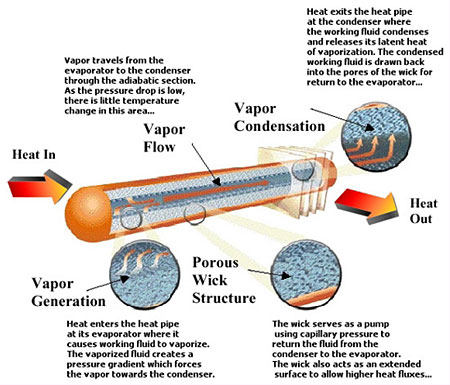How does Shuttle I.C.E. heat pipe technology work?
 A heat pipe is a heat transfer device with an extremely high effective thermal conductivity. Heat pipe is a vacuum tight vessel which is evacuated and partially back-filled with a working fluid.
A heat pipe is a heat transfer device with an extremely high effective thermal conductivity. Heat pipe is a vacuum tight vessel which is evacuated and partially back-filled with a working fluid. Heat pipes transfer heat by the evaporation and condensation of a working fluid. As heat is input at the evaporator, fluid is vaporized, creating a pressure gradient in the pipe. This pressure gradient forces the vapor to flow along the pipe to the cooler section where it condenses, giving up its latent heat of vaporization. The working fluid is then returned to the evaporator by capillary forces developed in the porous wick structure or by gravity.

Heat pipes do not have a set thermal conductivity like solid materials due to the two-phase heat transfer. Instead, the effective thermal conductivity improves with length. Unlike solid materials, a heat pipe's effective thermal conductivity will also change with the amount of power being transferred and with the evaporator and condenser sizes. For a well designed heat pipe, effective thermal conductivity can range from 10 to 10,000 times the effective thermal conductivity of copper depending on the length of the heat pipe. |